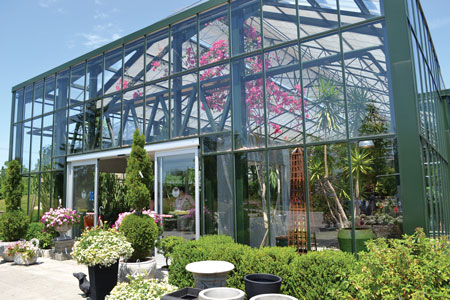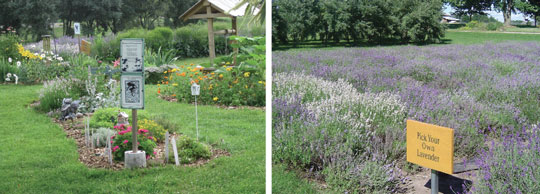11/26/2013
The Evolution of the Garden Center
Anne-Marie Hardie

In the past, the average garden center opened during the spring craze, trudged through a few months of constant work and then took a step back in the slower months. As cooler weather approached, most centers either shut down or limited their space.
Pictured: Because of Planterra’s focus on events, the owners have created photo-friendly areas throughout the garden center and grounds for weddings and gatherings.
The reason for the shutdown was financial; in most cases, the cost to operate their garden center at full capacity exceeded the revenue. But what if there was an opportunity to increase profit and strengthen your garden center’s community connection? For some innovative entrepreneurs, this is exactly what’s happening. There’s a fairly recent trend of independent garden centers allocating both their space and time in the off-season to other revenue-generating opportunities. These include incorporating children activity clubs, hosting seminars, weddings and even using the space to run trade shows. What makes this trend interesting is not the end result, but the individuals behind the changes. These successful owners recognized that the opportunity was there for “something more” and fulfilled an unmet need in their community.
Here Comes The Business
When Planterra in West Bloomfield, Michigan, opened up its Conservatory in 2010, it didn’t intend to be a venue for weddings. In fact, the Conservatory was created to be a high-end retail outlet supported by beautiful indoorscaping (the core of Planterra’s business).
“In 2010, we discovered it was a very different economy then when we began the project,” said Shane Pliska, president of Planterra. “What was interesting was that we started to get phone calls by brides asking if they could book their weddings in our building. There was a demand out there that we didn’t know existed.”
Planterra responded to this demand and began renting the conservatory space for weddings. Shane saw the business potential and so decided to operate a second business—event planning. Today, Planterra runs both their indoorscaping business year-round and their event planning from September to May. “When people book weddings, we control everything—we provide the food, alcohol, décor,” Shane said. “Planterra is essentially a one-stop-shop for everything that happens in our space.” During retail hours, the conservatory also is a retail outlet for those consumers who are looking for high-end indoor plant products.

Pictured above: Heritage Line uses its home-grown herbs in food served in its cafe, and as a bonus, customers can pick their own herbs from several themed gardens.
Event Central
When the second location of Bradford Greenhouses Garden Gallery in Ontario, Canada, was built, the company decided to operate this facility year-round (substantially reducing the retail space in the winter season). For Len Ferragine, owner/operator of Bradford Greenhouses Garden Gallery, this empty space was an opportunity to increase revenue and strengthen community connections. It began slowly, with an annual train trade show, but Len knew that this unused space had a high revenue potential.
In 2010, Greenhaus Productions was formed, a company created to plan and operate community events including trade shows, ski swaps and charity nights during the off-season. Today, Bradford Greenhouses Garden Gallery hosts several annual trade shows, including women’s shows, “boys with big toys,” a train show and home shows. These trade shows draw both customers and vendors into Bradford Greenhouses space, generating increased consumer awareness and revenue in a time where business is slower. Evening events have also become a fairly regular occurrence, from Bradford Greenhouses’ own Christmas Open House to charity events such as “Hot Night in the City,” a girls night out with more than 100 vendors.
For The Ladies
For the past four years, Beaver Bark Gift and Garden Center, Kirkland, Washington, has featured extravagant Girls Nights Out, one at Halloween and one in the spring time. “Our key customers remain females 40 to 70 years of age with disposable income,” said Renae Bobbett, co-owner of Beaver Bark. “Our Girls Night Out drives a lot of sales, creates a buzz around town and increased traffic. Women tell other women and word about extraordinary fun times travels fast.”
Renae shares that the recent Halloween event was sold out at 350 attendees (tickets cost $30). Guests received pirate grub, entertainment, gift cards for best costumes and gold coins at the carnival games, which they traded in for discounts towards their purchases that evening.
Valerie Stensson, Vice President, Marketing and Purchasing at Sheridan Nurseries in Ontario, Canada, shares that the key to successful events lies in the staff. “It is critical to get staff involved; the face of the person putting on the event has to be enthusiastic,” said Valerie. “It’s really important to have a champion. We have a staff member in particular, Barbara, whom customers love connecting with. And so we began offering afternoon tea with Barbara.” This free learning session combines information with a cup of tea, encouraging Sheridan’s customers to connect and learn.
Seminars and learning sessions are another excellent way to strengthen community connection while helping to sell more product (customers typically buy what they’ve learned about). Independent garden centers can offer a variety of classes in both the seminar (discussion) style as well as hands-on workshops. Celebrity garden guest speakers are also a great technique to drive customers’ attendance.
Food For Thought
Offering food has always been a way to foster community and enhance an overall customer experience. Successful cafés encourage customers to linger and helps customers feel that the retail outlet is a part of their community.
At Heritage Line Herbs in Alymer, Ontario, this once-tobacco farm transformed into a wholesale/retail herb farm with a tea room/pizza shop. The tea room was originally based on what Deb Benner’s daughter wrote about from Vietnam. “Over time the tea room grew,” said Deb. “We have a lot of tour groups that come. The biggest group that we had is 65. We book groups for Tuesday and Wednesday, and it is open to the public Thursday to Sunday.”
Today, Heritage Line Herbs has expanded their tea room to offer both an afternoon tea and a pizza line (including gluten-free products), based on local, fresh products, which all include Heritage Line’s home grown herbs. As an added enhancement, Deb has constructed several theme gardens, including Little Italy (a pizza garden where customers can pick their own herbs) and a fairy trail, which leads to Geranium the garden gnome.
The Importance of Community
Children Garden Clubs have become a new way to foster a long-term connection with your customer base. In these experiences, children and parents alike learn about nature, the environment and develop an appreciation for science. Sheridan Nurseries offers a Little Diggers Club every second Saturday, where parents and children join together to learn about gardening and the environment. Recently, Bradford Greenhouses Garden Gallery has launched an innovative pilot project with their local school board. The concept behind the project was to connect the education curriculum to children workshops’ presented by experts in the garden centers. These workshops will take place during non-peak time periods.
Offering events, seminars and even a cup of coffee are excellent tools to build relationships and create that long-term customer. Independent garden centers have become a place to connect, learn and grow with their community.
“Community for our store and our farms is what keeps us going,” said Valerie. “All of these things are important for our community to understand, while we are running a business, you can’t do that without being cognizant of our community.”
GP
Anne-Marie Hardie is a freelance writer/speaker from Barrie, Ontario, and part of the third generation of the family-owned garden center/wholesale business Bradford Greenhouses in Barrie/Bradford, Ontario.